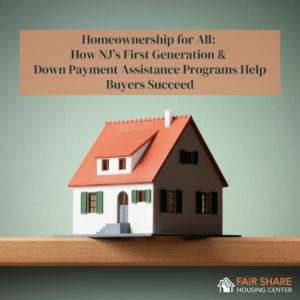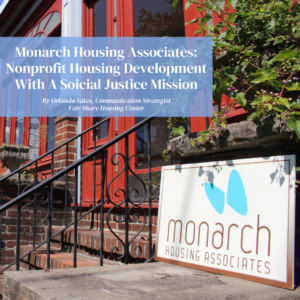Coalition Building: Working with Nationwide Advocates to Advance Housing Policy
June 27th, 2023
By Tanushree Bansal
Earlier this month, Fair Share Housing Center’s Executive Director, Adam Gordon, spoke at a panel hosted by New York University School of Law’s Furman Center about New Jersey’s Mount Laurel Doctrine and the lessons our state has learned from the Mount Laurel process. His remarks that afternoon demonstrated the growing collaboration amongst advocates from different jurisdictions as we work to confront the national housing crisis.
The housing movement is inherently a collaborative one. Every person deserves a place to call home, and often markets for housing are regional and centered around broad metropolitan areas that transcend state borders. For example, the New York City area might include people residing in parts of New Jersey, Connecticut, and Pennsylvania. The collective impact of high rents on communities across the country, combined with each geographic region’s unique housing policies, suggests that there is great learning potential in further collaboration between us. We can all benefit from an exchange of information that studies the results, failures, and successes of our various policy approaches to local housing crises.
This kind of knowledge sharing is increasingly becoming one of FSHC’s organizational priorities. We believe that many states can benefit from our work because New Jersey is one of few states in the country with an affirmative requirement for municipalities to construct deed-restricted affordable housing, and there is a growing interest in more affordable housing across the country. In recent years states such as California and Colorado have started to adopt laws to strengthen municipal requirements for affordable housing, and this spring, two nearby states saw significant efforts to revise their affordable housing systems in ways that better address the needs of their state’s residents. Recently, New York attempted to pass legislation that would allow for the provision of additional deed-restricted affordable housing as one of many mechanisms a town could use to satisfy its housing growth targets. While this section (Part F) of New York Senate Bill S4006C ultimately was stricken from the bill, it is promising that legislators in our neighboring states are beginning to take steps to advance fair housing.
Similarly, this past legislative session, Connecticut proposed HB6633 written in large part with New Jersey’s own fair share system in mind. The bill notably featured the explicit requirement of the construction of deed-restricted affordable housing, and FSHC Executive and Deputy Directors Adam Gordon and Rev. Eric Dobson submitted comments in favor of the bill when it was before the state legislature. Connecticut ultimately did not adopt the bill and instead added revised sections of it to a different bill, Senate Bill 998. Connecticut fair housing advocates Open Communities Alliance called this a “helpful step” among “several other positive housing reforms.” It’s apparent that many Connecticut legislators are invested in moving towards a more progressive affordable housing system and are aware that more must be done to make that a reality for Connecticut residents.
The fates of HB6633 in Connecticut and S2006C in New York demonstrate how affordable housing policy can be met with fierce political opposition, but the work done around the bills also demonstrates a hopeful trend—a growing interest amongst various states to implement fair share systems like New Jersey’s own. Our state’s affordable housing system is longstanding. Affordable housing in New Jersey has been state law since the Supreme Court’s Mount Laurel ruling in 1975, and the law has advanced substantially in these years as we fight daily to better meet the needs of our state’s most vulnerable residents. New Jersey’s progress took time, and even here much work remains. We hope that the steps taken by our neighbors towards addressing exclusionary zoning this spring leads to more success in future years.
In the meantime, we continue to share the lessons we’ve learned through our decades of experience, most recently through our latest report Dismantling Exclusionary Zoning: New Jersey’s Blueprint for Overcoming Segregation. Research from this report reveals that fair share policies are creating thousands of affordable homes in New Jersey and countering longstanding residential segregation in our communities, and that these policies may provide the same benefits to our neighbors. Given our successes, we hope to be a source of support, information, and encouragement as states across the country move towards developing their own progressive affordable housing systems, and we hope to learn alongside them as well.






